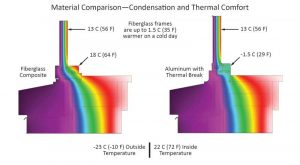Fiberglass versus vinyl
Fiberglass testing shows it is 10 times stronger than vinyl, based on the tensile strength test at peak load t/m² (lbf/in2). As a result, fiberglass can provide thinner profiles not only in the frames, but also in mullions. Typically, fiberglass windows can use 12.7 mm (0.5 in.) or 25.4 mm (1 in.) structural mullions that keep total widths at a minimum, which is more comparable to aluminum sightlines than vinyl.
Since vinyl lacks integral strength, overall sizes are constrained. Frames and mullions need to be wider and reinforced with aluminum or steel so there is much less visible glass in the openings. Many vinyl windows cannot be mulled with a four-way joint—that is, four windows mulled together into a composite window.
 A single fiberglass fixed window can be manufactured up to 6.5 m2 (70 sf). The thinner profiling enables fiberglass to achieve greater sightlines and more visible glass, which continues to be a design trend in the marketplace.
A single fiberglass fixed window can be manufactured up to 6.5 m2 (70 sf). The thinner profiling enables fiberglass to achieve greater sightlines and more visible glass, which continues to be a design trend in the marketplace.
With the popularity of large expanses of glass and labor availability challenges, mulling capabilities are an important consideration when choosing windows and doors. Due to material and manufacturing limitations of vinyl and vinyl composite windows, factory mulling options are often more limited than with fiberglass. Sleeker factory mulled combinations with reinforcing mullions are available with fiberglass windows and offer greater flexibility in design options.
Expansion and contraction and impact on durability
When comparing thermal efficiency, both materials offer similar thermal performance for U-factors and solar heat gain, however, fiberglass has a better expansion and contraction coefficient than vinyl (also referred to as PVC or plastic) which can help with product durability. Vinyl frames expand and contract more than fiberglass with temperature changes. Fiberglass shows the lowest thermal expansion and contraction (see Figure 1, page 9) among the most popular window materials.
Since fiberglass is partially made from glass, the frames expand and contract along with the insulated glass units (IGUs) to provide excellent protection against seal failure and provide long term durability.





WE used the fiberglass replacenment windows for their natural wood look and feel and fire resistance and strength on the El Cordova Hotel 1928, in Coronado, CA. many years back and as far as I know all is still going well there. Stuart Resor Architect